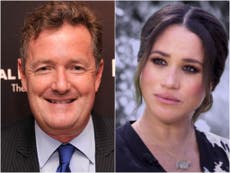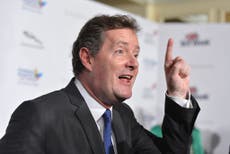Piers Morgan: The making of a TV tyrant
The newly decamped ‘Good Morning Britain’ host has always had an impulsive love for a feud – but, asks Vincent Wood, is there a real Piers Morgan beneath the media facade?


When Piers Morgan talks about his life, he talks of conflict. He relishes feuds, and the opportunity to make up from them. He trots out stories of being punched in the face and battered in the headlines as punctuation to the episodes of his life. He will gladly point out that he is yet to leave a job without being fired – a half-truth considering his rise from night reporter on The Sun to the youngest newspaper editor of a generation when he took on the News of the World at 28.
As with all culture war contrarians with a taste for outrage, the question becomes whether he means any of it. Is it the real Piers when he casts doubt on Meghan Markle’s account of her experience with mental illness? When he delegitimises the experience of trans people? Or is the real Piers the Mirror editor who took on the government over the Iraq war? The bullish Good Morning Britain interviewer that No 10 refused to sit their ministers in front of for 201 days? Is he a rent-a-gob willing to pull out a contrary and frequently damaging viewpoint at a moment’s notice, or a champion of the tabloid moral cornerstone that is public interest, and the purest distillation of vox populi?
Of course he can be both of these men. His life has been one of warring contrast – on the one hand the loud, spiky caricature of a mad newspaper boss who is driven by wars of words, on the other a subtle social chameleon who schmoozes and amuses those around him to survive.
Morgan was born in Surrey in 1965 to Vincent and Gabrielle O’Meara, losing his father a year later in a car accident. His mother remarried to Glynne Pughe-Morgan, who took on Piers as well as his elder brother Jeremy. Morgan, who never knew his father, calls him dad, and has praised him for taking on the two boys while a man in his twenties.
However, once these basic facts are laid down Morgan gets a hold of his life story, and a certain amount of tabloid mythologising plays out, where you are left not necessarily to question if what he says is true, but just how true it is. He will say he was instructed by nuns as a boy - and while his mother did raise him Catholic, he appears to relish the juxtaposition between his journalistic sleaze and their puritanical piety enough to make you question if this occurred with any great frequency. He will say he learnt to read through the papers, perhaps feeding into the depiction of a youthful prodigy that would later be taken under the wing of The Sun’s Kelvin Mackenzie and News Corp’s Rupert Murdoch. He will describe himself as the child bartender of The Griffin Inn, the village pub his parents co-owned while he received his primary education from age seven at the private Cumnor House prep school. “I was always very cocky and noisy in the pub,” he told The Times in 2008. “I loved holding forth, hearing the sound of my own voice, and a lot of people found it amusing. So I just carried on.”
And while he talks of not having much money around growing up, his private education – including two years of boarding school – set him up for a certain upper middle class life. He relished the compulsory daily sport, the air of competition and confidence it gave him. He pored over the biographies of the famous and successful. He could also see the scale of the financial investment around him. That changed dramatically when his private learning gave way to state schooling as he turned 13, with his father unable to pay for him and Jeremy as well as their siblings Rupert and Charlotte.
Here more storytelling comes to play, with Morgan keen to paint the foppish middle class character at odds with the world around him. “At the time the change felt cataclysmic” he told The Times again, this time in 2016 “A bloke with a multi-coloured mohican beat me up on the first day. Why? Because my name was Piers Stefan Pughe-Morgan and they had never had one of those so I had to be beaten up.”
The blend of self-deprecation and self-awareness perhaps plays well to acknowledge Morgan’s class clash. It could even serve as the font from which his present day attempt to speak for the silent majority flows – an ability to live both in the upper echelons of society and among us normal folk through a tacit acceptance of who he is and what he sounds like. But his brother Jeremy would tell it differently. Piers was “a chameleon” at school, he told the paper. “He made friends with the largest boys there, who protected him.”
Morgan, as has often been the case with polarising figures looking to steel their individual identity against the perception of half the country, appears to deeply cherish the relationship he has with his family – in particular his siblings and his children. And while social media hosts birthday snaps galore of his nearest and dearest, his relationship to Jeremy seems particularly formative. The elder brother, who went on to join the military and supported the war in Iraq as his brother opposed it in his paper, comes across as the brawn to his brain. It was a combination which early on proved Morgan’s love for poking at others and revelling in the chaos that unfolded. “My brother wasn’t the most quick-witted of spanners”, Piers said. “He had a very short fuse; I found it amusing to light it and watch it explode. We were very competitive and my mother did everything to stop us fighting. I’ve just always loved verbal combat.”
An ultimately underwhelming stint at Lewes Priory Sixth Form – which has produced no shortage of Tory MPs as well as Labour’s Lloyd Russell-Moyle and Sunday Times editor Emma Tucker – saw him struggle to excel, receiving a U for Italian despite having previously been taught Latin. He recalls his A-level history teacher, Mr Freeman, would tell his mother “Your boy is a buffoon” in a single-sentence parent teacher meeting one year. That Morgan would say Mr Freeman was the teacher he thought most fondly of, and only support this assertion with that anecdote, is perhaps telling.
Then to wade into the timeline is to embrace the haziness of a man telling their own story once again. Either, as he told The Independent in 2008, he turned down a place at Warwick for the bright lights of journalism, or, as he told The Independent in 1994 he didn’t get the grade he needed, spent a year clerking at Lloyd’s of London, then moved on to revered Harlow Technical College. Either way it was there he would do the graft of learning shorthand and some much-needed lessons in libel law before holding out until he could land on a local paper in the capital, joining the Surrey and South London newspaper group. He was the last in the class to get a job on a local, which had more to do with his ambition than any individual struggle. “I’d been told the stories were juiciest in London and could be sold to the national papers”, he recalled.
That demand for national attention saw him particularly focus in on crime reporting, a beat with an ability to organically produce the gruesome and the sensational. “He was a natural,” Joan Mulcaster, the associate editor of the Sutton Herald, told The Guardian in 1994. “He had this knack of being able to get old ladies to talk to him.” With a good word from Mulcaster he would find himself night reporting for The Sun, before landing on the “Bizarre” celebrity pages under the editorship of Kelvin Mackenzie – one of a string of strong men in Morgan’s life, known for his tyrannical newsroom style, his “Freddie-Starr-Ate-My-Hamster” headline wizardry, and his false and derogatory claims around the Hillsborough tragedy.
The two are clearly deeply fond of one another’s abilities. Morgan, who by then had scrubbed the Pughe from his name, will call Mackenzie the “master of verbal jousting”, which is of course among his own favourite sports. Meanwhile Mackenzie was happy to joke in print in 2016 that Piers should follow in a pre-victory Donald Trump’s footsteps, take on the Labour leadership and fight his way to No 10. The great breakthrough that led to Piers Morgan being the man he is today, however, came from the unlikely involvement of Bros, the late Eighties pop duo.
Piers Morgan did not, and quite possible does not, care about pop music. However after interviewing the pair Mackenzie saw opportunity in one snap their photographer had caught – not just of the two singing brothers, but of the relatively unknown, gangly hack awkwardly shaking their hand as he beamed into the camera. Piers says that the decision was all Mackenzie’s, that he had no intention of finding himself splashed across the showbiz column in a flurry of self-promotion. Roy Greenslade, who worked on the paper at the time, would later write in The Guardian that Mackenzie had burnt so many bridges that the ability to show his man alongside the stars would at least help to rehabilitate the publication in the eyes of a furious army of PRs.
It’s here that Piers the character is perhaps created, although given it is also Morgan’s first true foray into public life, that may also be mythologised somewhat. “I became the Friend of the Stars” he told The Independent in 1994. “A rampant egomaniac, pictured all the time with famous people – Madonna, Stallone, Bowie, Paul McCartney, hundreds of them. It was shameless, as they didn’t know me from Adam. The Sun had had a bad time, after losing an action with Elton John, but this was harmless and funny. The publicity people from the record companies were all in on the joke.”
He can play it off as a character, but you can see this Piers today. It’s present in the man who relished the opportunity to get the first international TV interview with Donald Trump after he became president, only to toss him softball questions and sycophantic praise. It’s present in his relentless name-dropping – starting an Oxford Uni society lecture by saying he had a bet with Kanye West on his attendance levels. It’s perhaps present in his references to his relationship with Meghan Markle, who he met only once in a pub before she went off to go on her first date with Prince Harry, and soon after never spoke to him again. Morgan has thrived and survived off his ability to get along with powerful people, a mutualism that has helped keep many of them in the spotlight.
That’s not to say he isn’t happy to burn a bridge. As being punched in the face several times by Jeremy Clarkson at the British Press Awards in 2004 for reporting on his infidelity would attest to, he really does love a feud. Morgan proudly retells that in battering his skull, Clarkson actually broke his own little finger, while he also managed to get in a barb about his three-year-old being able to hit harder. Still it was he that woke up the next morning to find his scarred, gouged face looking back at him in the bathroom mirror, a circumstance he described as a “pathetic” moment as he strived to make his then paper the Daily Mirror a reputable campaigning outfit.
What appears to drive him, more perhaps than public feuds, is that anyone cares. “I probably am a bit of an attention seeker” he said in 2015 when asked about his motivations. “I like being in the middle of things. I like putting my four pennies in, stirring the pot, having a bit of fun”, he added, before attacking people for “taking stuff too seriously” if not a life-or-death circumstance.
“I’m a lot more self-aware than people think,” he told The Times in 2016, again attempting to embed the idea that his TV persona is an entirely separate character. “People probably look at me and think, ‘Ah, he just doesn’t get it.’ But I do. I’ve played up a caricature, and found it pretty beneficial. I prefer being a slightly polarising, very opinionated person and a lot of people are going to find that very annoying.”
Overall it is his belief in the public interest of going on the attack when it comes to any public institution, be they politician or priest – or any celebrity: after all, they need him as much as he needs them – that perhaps creates the great conflict behind Morgan. A man who will willingly cut off, berate and intimidate reporters who ask about his own scandals and personal life, but believes his ability to cast doubt on the experiences of people like the Duchess of Sussex is sacrosanct. A man who will play down his portrayal as a tabloid monster as an act but keep any evidence to the contrary private. A man who believes everyone’s story should be told the way he sees fit – including his own.




Join our commenting forum
Join thought-provoking conversations, follow other Independent readers and see their replies
Comments